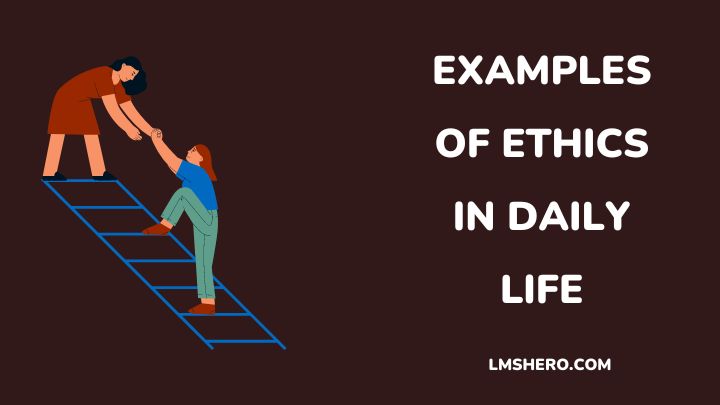Ethics explores the rationale behind our moral judgments and studies the role of humanity in the natural world, interpersonal relationships, freedom, responsibility, and fairness. However, do you know the examples of ethics and how they influence our daily life?
As humans, integrity, honesty, selflessness, and loyalty are some examples of ethics for us to exhibit which exonerate us, and knowing the reasons for exhibiting them will motivate us and contributes to our daily life.
This article explores what ethics is, some examples of ethics, and how these ethics apply to our daily life.
Read on to learn more.
What is ethics?

Ethics, similarly called moral philosophy is a discipline that concerns itself with the study of good and bad in society. It is based on moral values that dictate what humans do, usually in terms of rights, obligations, societal benefits, justice, or specific virtues.
Ethics addresses issues at every level and focuses on the nature of ultimate value and the criteria by which human actions can be judged as right or wrong.
Even though ethics has always been regarded as a subfield of philosophy, it is related to a wide range of other fields of study, such as anthropology, biology, economics, history, law, politics, sociology, theology, and many other fields.
Examples of ethics
The following are some examples of ethics:
1. Honesty
Honesty is seen as an important value by a lot of people. It is expressed by an individual from their personal to professional life and ensures that they always say the truth no matter what the case may be.
2. Loyalty
Another personal ethic that is shared by the majority of working professionals is loyalty. People who have loyalty exhibit trustworthiness and faithfulness in all of their interactions and can be relied upon to uphold their loyalty in all circumstances.
3. Integrity
Integrity is the dedication to keeping one’s moral convictions in whatever circumstance. It is an essential component of trustworthy and healthy relationships, both in and outside of the workplace.
4. Respect
People with strong personal ethics treat others with dignity and respect. They do not discriminate based on a person’s religion, sexual orientation, or racial background, and they respect the autonomy, rights, and interests of others.
5. Selflessness
Selfless people put the needs of others before their own and do not behave in a manner that is self-centred or designed to benefit themselves. They place the needs of others ahead of their own by considering their situations and demands.
6. Responsibility
A person who has a strong moral code is willing to accept responsibility for their deeds and to make corrections or reparations when the situation calls for it.
How ethics contribute to daily life
1. To improve the society
When we work to improve society, we benefit by improving our own lives and the lives of our loved ones and friends. Society would be a horrible place without ethics.
Everyone is given the same rights in most western communities, which are built on the principle of equality, however, without ethics, this is not possible.
2. To get good jobs
Often, employers consider a potential employee’s past behavior a good indicator of future behavior. As a result, it will be difficult for someone with a history of unethical behavior to land a good job because they cannot be trusted.
3. To help grow your business
Typically, businesses that have questionable ethical histories are often viewed with suspicion and are less likely to grow on positive word-of-mouth advertising. This is especially true in cases when social media makes it simple to access client reviews.
4. It reduces stress
When we make morally questionable choices, we often feel uneasy and worried about our actions. However, when we approach issues from an ethical standpoint, we have nothing to worry about.
Why is ethics important?
The following are different reasons why ethics is important:
1. Makes it easier for leaders to lead their teams effectively
When a leader follows a clear and honorable code of ethics, their team is more likely to follow their lead and feel confident in the contributions they make to the organization as a whole.
2. Instills trust and confidence in leaders
Leaders and other professionals who consistently maintain strong ethical values regardless of circumstances are more likely to be trusted and supported by their colleagues and employees.
3. Gives you a solid foundation on which to base your decisions
When a person possesses a strong sense of personal ethics, they are better able to make decisions and take action in circumstances that could otherwise appear to be difficult.
4. Improve your decision-making skills
A professional’s decision-making skill is dependent on personal and professional ethics, as well as what you perceive to be good or bad. Having strong ethics makes decision-making easier and more efficient.
5. It helps you set a proper standard of behavior
Ethics play an important role in helping people establish an appropriate standard of behavior for themselves in the workplace and in everyday life. This is called ethical behavior, it refers to an individual’s ability to make wise decisions based on their nature.
6. Gives you the desired motivation
People who have high ethics are often readily self-motivated and eager to go the extra mile to complete a task or goal on time.
FAQs
What are the branches of ethics?
The two branches of ethics are metaethics and normative ethics (applied ethics).
Is it possible to be moral but not ethical?
Yes, you can be ethical without being moral.
A person without a moral compass can adhere to ethical standards to maintain a social position. On the other hand, you can breach ethics if you think it is morally correct.
Who founded ethics?
The founding father of ethics is Socrates.
What is the earliest source of ethics?
The oldest source of ethics is religion.
Conclusion
While everyone has their unique moral compass, ethics is the common factor that binds people in society, such as, such as honesty, respect, etc.
Consequently, these ethics have an impact on different phases of our lives and help us both professionally and in our personal lives.
As humans, when faced with difficult circumstances, our ethics can help us decide what is right and wrong and influence our behavior in response to such circumstances.
I hope you found this article interesting. You can also read examples of high moral standards and their importance.
Thanks for reading.







